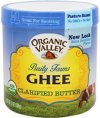I noticed recently that I have a lot of old Ghee jars that have old dates on them. It doesn't say if it's an expiration date or best by date. But I stock up on them and have about 20 or so that are labeled 12-2015. I ate one that was July 2016 and it was fine.
They are the Purity Farms brand, with virtually zero protein in them. I was never able to figure out how they get out all the protein. But anyways, the jars are glass with a plastic lid. And they have cellulose plastic wrapped around them. So they're not vacuum sealed I don't think, but the lids are really tight, and I sometimes need a rubber lid gripper pad to get them off.
I stock up on them because they're an easy fat source, although they're expensive. So I plan to rotate them out. My only concern is that the old ones might not be good. I don't think they'd be at risk of botulism or anything, and I usually am really cautious about old canned and jarred food.
I suppose I could boil them for 10 minutes if I were really in doubt. And worst case scenario I could stick a floating wick in them and use them as candles. Any thoughts?
They are the Purity Farms brand, with virtually zero protein in them. I was never able to figure out how they get out all the protein. But anyways, the jars are glass with a plastic lid. And they have cellulose plastic wrapped around them. So they're not vacuum sealed I don't think, but the lids are really tight, and I sometimes need a rubber lid gripper pad to get them off.
I stock up on them because they're an easy fat source, although they're expensive. So I plan to rotate them out. My only concern is that the old ones might not be good. I don't think they'd be at risk of botulism or anything, and I usually am really cautious about old canned and jarred food.
I suppose I could boil them for 10 minutes if I were really in doubt. And worst case scenario I could stick a floating wick in them and use them as candles. Any thoughts?


